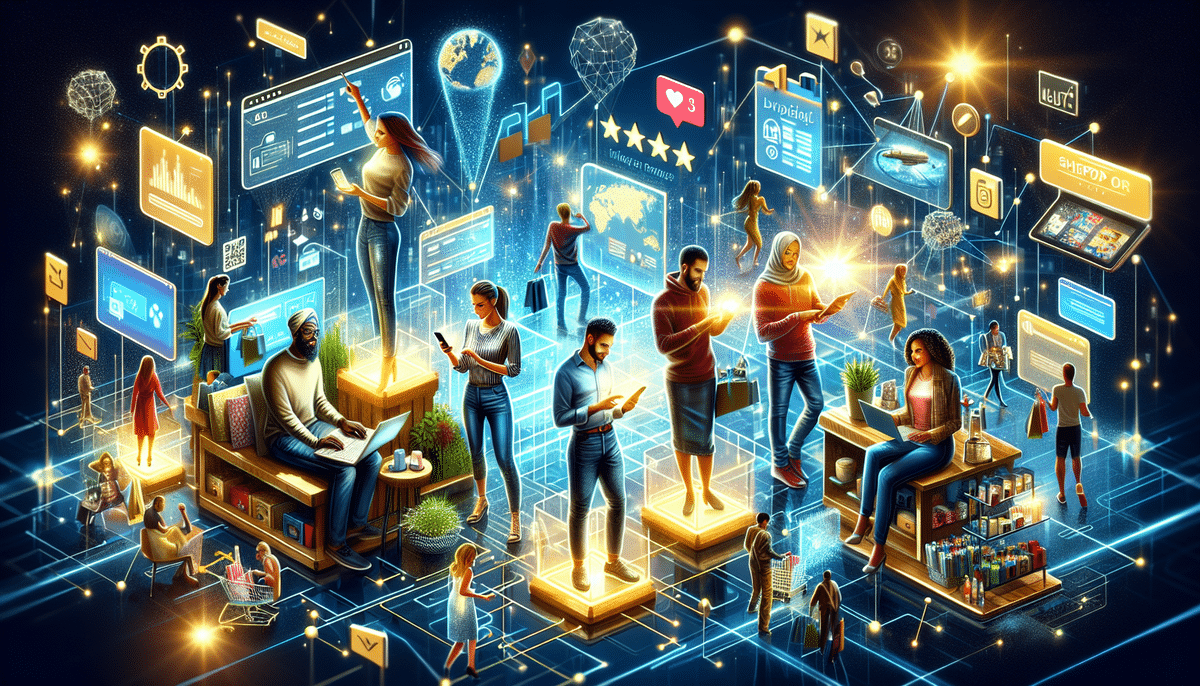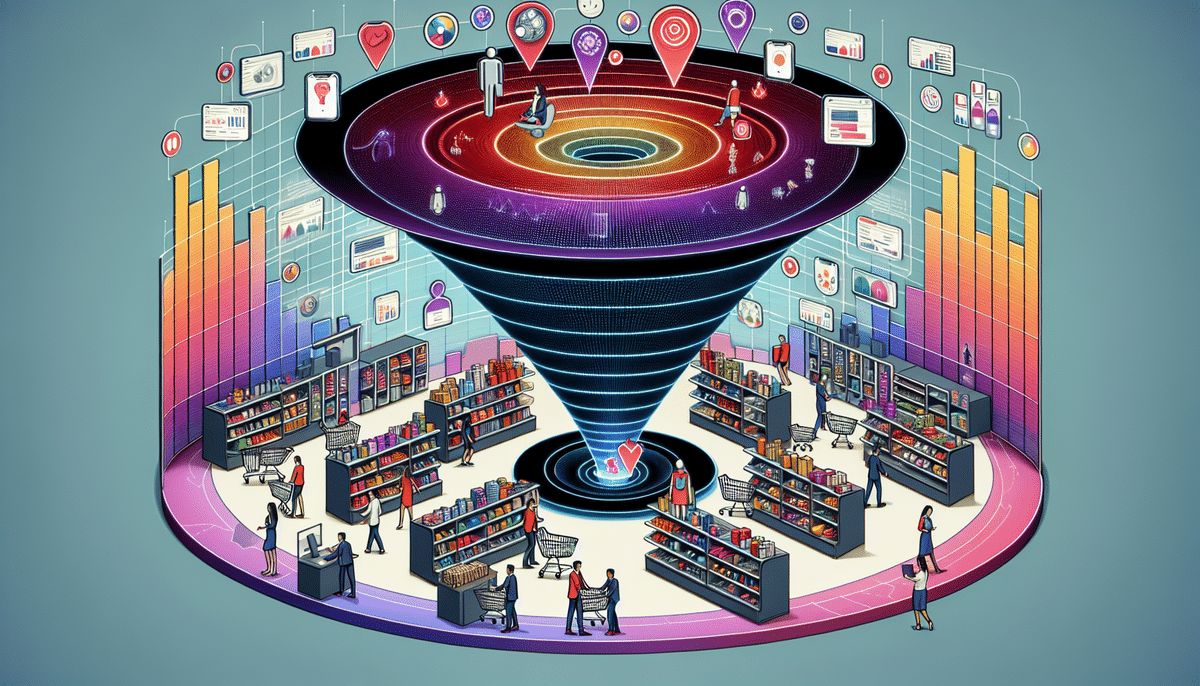Understanding the Benefits of B2C (Business-to-Consumer) Business Models
In the world of commerce, there are generally two types of business models: B2B (Business-to-Business) and B2C (Business-to-Consumer). While both models have their distinct advantages, B2C models are especially critical for consumer-focused industries. In this article, we'll explore the key differences between B2C and B2B models, the benefits of adopting a B2C model, common challenges faced by businesses in this field, and strategies to overcome them.
Exploring the Key Differences between B2C and B2B Business Models
B2B business models involve companies selling products or services to other businesses. Unlike B2C models, where the target customer is the end consumer, B2B models focus on building long-lasting relationships with clients who buy in bulk and repeatedly over time. On the other hand, B2C models concentrate on building a strong brand identity and delivering a personalized experience to individual consumers through targeted marketing and sales efforts. The key differences lie in the audience, messaging, and the depth of relationships built with customers.
Another significant difference between B2B and B2C business models is the sales process. In B2B models, the sales cycle is typically longer and more complex, involving multiple decision-makers and stakeholders. This is because B2B purchases often involve larger sums of money and have a greater impact on the buyer's business. In contrast, B2C sales are usually simpler and more straightforward, focusing on making quick and easy sales to end consumers.
Additionally, B2B and B2C models differ in the types of products or services offered. B2B companies often provide specialized products or services tailored to the specific needs of their clients. In contrast, B2C companies typically offer a wider range of products or services that appeal to a broader audience. B2B companies may also offer ongoing support and maintenance services, whereas B2C companies may focus more on providing a one-time purchase experience.
Why B2C Business Models are Critical for Consumer-Focused Industries
B2C models are essential for consumer-focused industries because the end consumer drives the demand for products or services. A successful B2C product or service presents clear value to the end consumer, meets their needs and wants, and creates a positive experience. By adopting a B2C model, companies can better understand their customers' needs and build stronger relationships with them.
Furthermore, B2C models enable companies to gather valuable data on consumer behavior and preferences. According to a Statista report from 2023, 78% of consumers are more likely to purchase from businesses that offer personalized experiences. This data can be used to improve products and services and to create targeted marketing campaigns that resonate with the audience. Additionally, B2C models often involve direct communication with customers, leading to valuable feedback and insights that enhance the overall customer experience. Adopting a B2C model helps companies stay competitive in consumer-focused industries by providing a deeper understanding of customer needs and preferences and by fostering stronger customer relationships.
The Role of Personalization in B2C Business Models
One of the key advantages of B2C models is the ability to deliver highly personalized experiences to customers. This can range from personalized marketing and advertising campaigns, tailored product offerings, to targeted promotions. By using data analytics and customer feedback, companies can gain insights into consumer behaviors and preferences, allowing them to tailor their products and services accordingly, thereby enhancing the customer experience.
Personalization also plays a crucial role in building customer loyalty. When customers feel that a company understands their needs and preferences, they are more likely to remain loyal and continue making purchases. This can lead to increased customer lifetime value and a higher return on investment for the company.
However, it is important for companies to balance personalization with privacy concerns. Customers may feel uncomfortable with companies collecting and using their personal data, especially if there is a lack of transparency about how that data is being used. Therefore, companies should be transparent about their data collection and usage policies and give customers the option to opt-out of data collection if they choose to do so.
How Social Media is Revolutionizing B2C Marketing Strategies
The rise of social media has significantly heightened the importance of building a strong online presence for B2C companies. Platforms such as Facebook, Instagram, and Twitter serve as valuable tools for businesses to advertise and communicate with customers. Through these platforms, businesses can engage with customers, build brand loyalty and awareness, and gain insights into consumer behavior.
One of the key advantages of social media marketing is its cost-effectiveness. Compared to traditional advertising methods, social media advertising is relatively inexpensive and can reach a wider audience. According to a Hootsuite report from 2023, 72% of businesses found social media marketing to be an effective way to increase brand awareness.
Another benefit of social media marketing is its ability to provide real-time feedback. Through social media analytics, businesses can track the performance of their campaigns and make necessary adjustments to improve results. This allows businesses to quickly adapt to changing market trends and consumer preferences.
The Importance of Customer Feedback in Successful B2C Business Models
Customer feedback is essential for any business to understand its customers' needs and wants. In a B2C model, where the focus is on creating an exceptional customer experience, customer feedback becomes integral to the business's success. Through feedback, businesses can identify areas of improvement, enhance their products and services, and build long-lasting relationships with customers.
Moreover, customer feedback can help businesses stay ahead of their competitors. By listening to customer feedback, businesses can gain insights into what competitors are doing well and where they are falling short. This information can be used to improve their own products and services and to differentiate themselves from competitors. Additionally, customer feedback can help businesses identify new growth opportunities by uncovering unmet customer needs and desires.
Best Practices for Building a Strong B2C Brand Identity
Building a strong brand identity is essential for any business in the B2C world. It is the foundation upon which businesses build trust with customers and establish themselves as a go-to source for the products or services they offer. Best practices for building a strong brand identity include:
- Create a Clear and Concise Brand Message: Ensure that your brand message is easily understandable and reflects your company's values and mission.
- Establish Brand Guidelines: Develop a set of guidelines that dictate the visual and verbal aspects of your brand to maintain consistency.
- Maintain Consistency in Branding: Consistent branding across all channels helps reinforce your brand identity and fosters trust.
- Engage with Customers through Multiple Channels: Utilize various platforms such as social media, email, and your website to interact with customers using a unified voice.
Another important aspect of building a strong B2C brand identity is staying up-to-date with the latest trends and technologies. This includes having a robust online presence, utilizing social media platforms effectively, and keeping up with the latest marketing strategies. Listening to customer feedback and adapting your brand accordingly is also crucial. By staying current and responsive to customer needs, businesses can build a strong and lasting brand identity that resonates with their target audience.
The Impact of Technology on the Evolution of B2C Business Models
The use of technology in B2C models has significantly impacted how businesses interact with customers and market their products and services. With advancements in technology, businesses can now use chatbots, artificial intelligence (AI), and virtual assistants to provide personalized customer service. Additionally, companies can leverage data analytics to better understand consumer behaviors, allowing them to deliver highly customized experiences.
Moreover, technology has enabled businesses to expand their reach and target new audiences through various digital marketing channels such as social media, email marketing, and search engine optimization (SEO). According to a McKinsey report from 2023, businesses that effectively leverage technology see a 30% increase in customer engagement.
This technological shift has transformed the traditional B2C business model, allowing businesses to directly engage with their customers and build long-lasting relationships.
How to Leverage Data Analytics for Effective Customer Segmentation in B2C Businesses
Data analytics has become a valuable tool in B2C businesses, allowing them to gain a comprehensive view of their customers' past and present purchasing behaviors. This visibility enables businesses to segment their customers effectively, tailoring their marketing and sales efforts to specific groups that share similar demographics, interests, or behaviors.
Effective customer segmentation can lead to more personalized marketing strategies, higher conversion rates, and improved customer satisfaction. For example, by analyzing purchase history and browsing patterns, businesses can identify high-value customers and target them with exclusive offers or loyalty programs.
Additionally, data analytics can help businesses identify emerging trends and adjust their strategies accordingly. Utilizing tools like Google Analytics or Tableau can provide actionable insights that drive informed decision-making and strategic planning.
Innovations in E-Commerce and Their Effect on B2C Business Models
The explosive growth of e-commerce has revolutionized how B2C businesses interact with and sell products to their customers. By leveraging the convenience and speed offered by e-commerce platforms, businesses can enhance their customer experience by providing faster and more convenient ways for customers to purchase goods and services online. This has led to a significant increase in online customer engagement and sales in the B2C world.
Innovations such as one-click purchasing, subscription models, and augmented reality (AR) shopping experiences have further transformed the e-commerce landscape. According to a Forbes article from 2023, AR shopping experiences can increase customer engagement by up to 50%, providing a more immersive and interactive shopping experience.
These innovations not only improve the customer experience but also provide businesses with new ways to differentiate themselves in a competitive market.
The Future of B2C Business Models: Trends and Predictions
The future of B2C business models is an intriguing topic, with many trends emerging that will shape the way businesses interact with consumers. One of the most significant trends is the rise of mobile commerce, leveraging smartphones and other mobile devices to offer personalized experiences to customers on the go.
Other emerging trends include:
- Augmented Reality (AR) and Virtual Reality (VR): Enhancing the shopping experience by allowing customers to visualize products in their own environment before making a purchase.
- Social Commerce: The integration of e-commerce functionalities directly within social media platforms, enabling seamless shopping experiences.
- Influencer Marketing: Utilizing social media influencers as brand ambassadors to reach broader audiences and build trust.
- Direct-to-Consumer (DTC) Sales: Allowing businesses to bypass traditional retail middlemen, fostering direct relationships with customers.
- Sustainability and Ethical Practices: Increasing consumer demand for environmentally friendly and ethically produced products influencing purchasing decisions.
According to a Gartner report from late 2023, global B2C e-commerce sales are expected to reach $7.4 trillion by 2025, driven by these evolving trends.
Case Studies: Successful Implementations of B2C Business Models Across Different Industries
Implementing B2C business models successfully can be challenging, but the rewards can be immense. Several companies have successfully transitioned from a B2B to a B2C model, including Nike, Apple, and Procter & Gamble. These companies have leveraged the benefits of B2C business models to build long-lasting relationships with customers and significantly increase sales revenue.
Nike has excelled in creating a strong brand identity and personalized consumer experiences through its Nike+ app and interactive retail stores. Apple focuses on delivering high-quality, innovative products combined with exceptional customer service and seamless integration across its ecosystem. Procter & Gamble has successfully utilized data analytics and targeted marketing campaigns to reach a broad consumer base effectively.
These case studies highlight the importance of understanding consumer needs, leveraging technology, and maintaining a consistent brand message in achieving B2C success.
Common Challenges Faced by Businesses Adopting a B2C Model and How to Overcome Them
Adopting a B2C model does not always come without challenges. One of the most significant issues companies face is building a robust online presence and effectively reaching their target customers. Other challenges include:
- Understanding Consumer Behavior: Accurately interpreting consumer data to inform marketing and product development strategies.
- Personalized Marketing: Creating tailored marketing campaigns that resonate with diverse consumer segments.
- Competition: Competing against larger, established brands with significant market share and resources.
- Customer Retention: Maintaining customer loyalty in a highly competitive and dynamic market.
To overcome these challenges, companies can:
- Leverage Marketing Professionals: Utilize the expertise of marketing professionals to develop and execute effective strategies.
- Invest in Technology: Adopt advanced technologies like AI and data analytics to gain deeper insights into consumer behavior and optimize marketing efforts.
- Focus on Customer Experience: Enhance the overall customer experience through personalized interactions, high-quality products, and responsive customer service.
- Differentiate the Brand: Develop unique value propositions and innovative products to stand out in the marketplace.
By addressing these challenges proactively, businesses can successfully transition to and thrive within a B2C model.
Measuring Success: Metrics for Evaluating the Performance of Your B2C Strategy
Metrics are essential tools for measuring the success of any business strategy. In a B2C model, businesses can use key performance indicators (KPIs) to track progress and gauge the effectiveness of their marketing and sales efforts. Common KPIs include:
- Website Traffic: The number of visitors to your website, indicating the reach of your online presence.
- Conversion Rates: The percentage of visitors who take a desired action, such as making a purchase or signing up for a newsletter.
- Customer Acquisition Cost (CAC): The cost associated with acquiring a new customer, helping to evaluate the efficiency of marketing efforts.
- Customer Lifetime Value (CLV): The total revenue a business can expect from a single customer account throughout the business relationship.
- Return on Investment (ROI): A measure of the profitability of marketing campaigns and other business activities.
- Engagement Metrics: Measures such as social media interactions, email open rates, and click-through rates that indicate how actively customers are engaging with your brand.
Regularly monitoring these metrics allows businesses to identify areas of success and those needing improvement, facilitating data-driven decision-making and continuous optimization of their B2C strategies.
Conclusion: Why Every Business Should Consider Adopting a B2C Model
In conclusion, B2C business models are critical components of the modern commerce landscape. With the rise of technology, social media, and e-commerce, businesses can leverage data analytics and consumer insights to connect with customers and create personalized experiences that drive sales and enhance customer relationships. By adopting a B2C model, businesses can significantly enhance their bottom line and solidify their place in the global marketplace.
For more insights and resources on optimizing your B2C strategy, visit ShipScience.




















